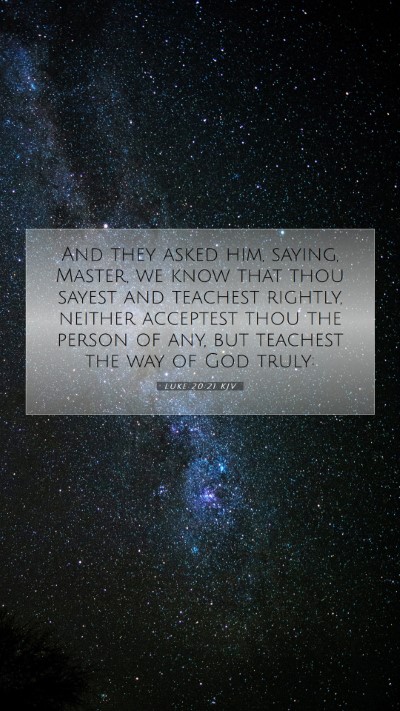Understanding Luke 20:21
Luke 20:21 states: "And they asked him, saying, Master, we know that thou sayest and teachest rightly, neither acceptest thou the person of any, but teachest the way of God truly."
Bible Verse Meaning
This verse addresses the profound acknowledgment by the questioners of Jesus' authority in teaching and His impartiality. The intent behind their inquiry is not purely to seek wisdom but rather to entrap Jesus in His own words.
Bible Verse Interpretations
- Deception and Dilemma: As Matthew Henry notes, the leaders were attempting to deceive Jesus with flattery, hoping to put Him in a perilous position regarding taxes.
- Recognition of Authority: Albert Barnes emphasizes that their recognition of Jesus as a truthful teacher underscores His divine authority and the integrity of His teachings.
- Human Nature: Adam Clarke highlights the nature of their approach—human beings often resort to flattery when they intend to mislead, showing the contrast between truth and deceit.
Bible Verse Understanding
The verse reflects the dual nature of Christ's ministry: teaching the truth while confronting religious leaders' underhanded tactics. It also illustrates the challenges faced in interpreting biblical teachings amid human motives.
Bible Verse Explanations
When analyzing this passage, we observe that Jesus' reputation as a righteous teacher was known even among those who opposed Him. The phrase "neither acceptest thou the person of any" signifies that His doctrine was free from bias—a crucial biblical principle.
Contextual Analysis
This verse occurs during a critical phase of Jesus' ministry, where He is frequently challenged by Jewish leaders. The historical context reveals their growing hostility towards Him, and this question represents one of many attempts to discredit His authority.
Bible Study Insights
For Bible study groups or individuals engaging in online Bible study, this verse can spark discussions about the nature of Jesus' teachings, the importance of truth, and the motives behind our inquiries into Scripture. It invites reflection on how we approach biblical understanding with sincerity versus deceit.
Scripture Analysis
In-depth analysis of this verse could involve examining parallel accounts in the Gospels (Matthew 22:16-17; Mark 12:14) where similar interactions occur, offering multi-faceted views of the intentions of those questioning Jesus.
Historical Context of Bible Verses
The religious climate of first-century Judea was charged with partisan conflicts, making Jesus' impartial stance revolutionary. In His teachings, His refusal to align with a particular group or interpretation underscores His mission to reveal God's character authentically.
Applications of Scripture
This passage prompts readers to reflect on the importance of truth in teaching and the dangers of ulterior motives when engaging with religious leaders or texts. Practically, it teaches us to seek understanding of Scripture with an open and honest heart.
Related Bible Cross References
- Matthew 22:16-17
- Mark 12:14
- John 7:18
- Romans 2:6-8
- Proverbs 29:25
Conclusion
Overall, Luke 20:21 serves as both a teaching moment and a warning against the methods of those who seek to undermine truth. For those studying the Bible, understanding this verse enhances our grasp of Jesus' teachings, the context of His challenges, and the implications for our own study and application of Scripture.


